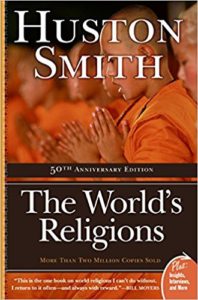 I think Huston Smith wanted his book to be an introduction to the world’s religions. He tried to distill each religion down to the basics with which everyone who practiced that religion would agree. He hoped to sift out the cultural and moralistic components so that his readers would see just how alike they all are. When you do this, he argued, what you have left is the common wisdom tradition. But unlike many religions, this wisdom tradition has no god. In chapter one, he defines religion as “the clearest opening through which the inexhaustible energies of the cosmos enter human life.”
I think Huston Smith wanted his book to be an introduction to the world’s religions. He tried to distill each religion down to the basics with which everyone who practiced that religion would agree. He hoped to sift out the cultural and moralistic components so that his readers would see just how alike they all are. When you do this, he argued, what you have left is the common wisdom tradition. But unlike many religions, this wisdom tradition has no god. In chapter one, he defines religion as “the clearest opening through which the inexhaustible energies of the cosmos enter human life.”
Inexhaustible energies of the cosmos does not equate with a personal Creator God.
Smith’s practical definition for god is personal fulfillment.
He wanted his explanations to have no judgments or biases attached. Religions, and the study of them, should bring people together. He wrote about embracing the world and our longing for togetherness.
I wanted to update my understanding of different religions with which I come into contact in our pluralistic society. Having only an understanding of the fundamental beliefs of a religion is not really going to help without knowing how those beliefs translate into actual practice or affect the daily lives of people. I want the people with whom I engage to know that I care about their culture and religious practices, about them. I also want to acquire an understanding of how people of other religions or philosophies see me as a Christian.
If you take away the culture and moralistic aspects, you take away the context.
People don’t see me as a follower of Jesus Christ; they see whatever generalized version of Christianity they have developed. The reverse is also true. I cannot see them as people without their context. I will just see a stereotype.
To me, the universe speaks to a Creator and logic tells me that if there is a Creator, then that Creator has purposes and desires for His creation.
It is philosophically untenable that God would say, “Any way you want to come to me will do.”
Smith’s lack of belief in a personal God causes Smith to fail, at least with Christianity, in his non-judgmental goal. In his treatment of the other religions, he ignored any issues of historicity but with Christianity, he felt the need to offer a mild reproof on the resurrection and the deity/humanity of Jesus. Zen could have its paradox but in Christianity, regarding the incarnation, “to say that such a contention is paradoxical seems a charitable way to put the matter…”* He wanted to believe that Jesus was just a man, albeit a very charismatic one and this bias interfered with his desire to be even-handed.
There is one area in which I found Smith’s book helpful. Although I believe that Jesus Christ is the way to God, I also believe, perhaps contrarily, that God has spoken to people everywhere through the ages and that humankind’s attempts to understand Him have resulted in seeds of truth sprinkled across the world. In ancient Egypt, Akhnaten preached one god; that was a seed that didn’t grow in that time and place. Hinduism’s goal is release from the bondage of existence. The Buddha preached “his ego-shattering, life-redeeming message.” The full connotation of Islam is “the peace that comes when one’s life is surrendered to God.” Christianity is about the release from the bondage of fear, guilt, and self through the love of God. The peace beyond all understanding that comes from surrendering your cares to God comes right out of Philippians. Smith’s emphasis on the likenesses showed me more of those scattered kernels than I might otherwise have seen. Although he never stated it, people want purpose and he showed how different peoples have taken their kernels of truth and interpreted them to answer the ultimate question: why am I here?
Smith’s worldview contrasts sharply with my own. His god was self-fulfillment, while mine is a transcendent personal God. He assumed that whatever works for a person is fine. I assume God has a particular way. He believed getting to the core of each religion would bring people together. I believe that the core is not where people live and only God Himself can bring us together. He valued comparisons over contrasts. I value knowing both. If I don’t know the contrasts, I could misstep. Even though Smith’s methods have limited application for my own learning goals, they do have some. Not only do the likenesses show to me God’s work in our world, but they also give me points of agreement in conversation, which is the beginning of understanding.